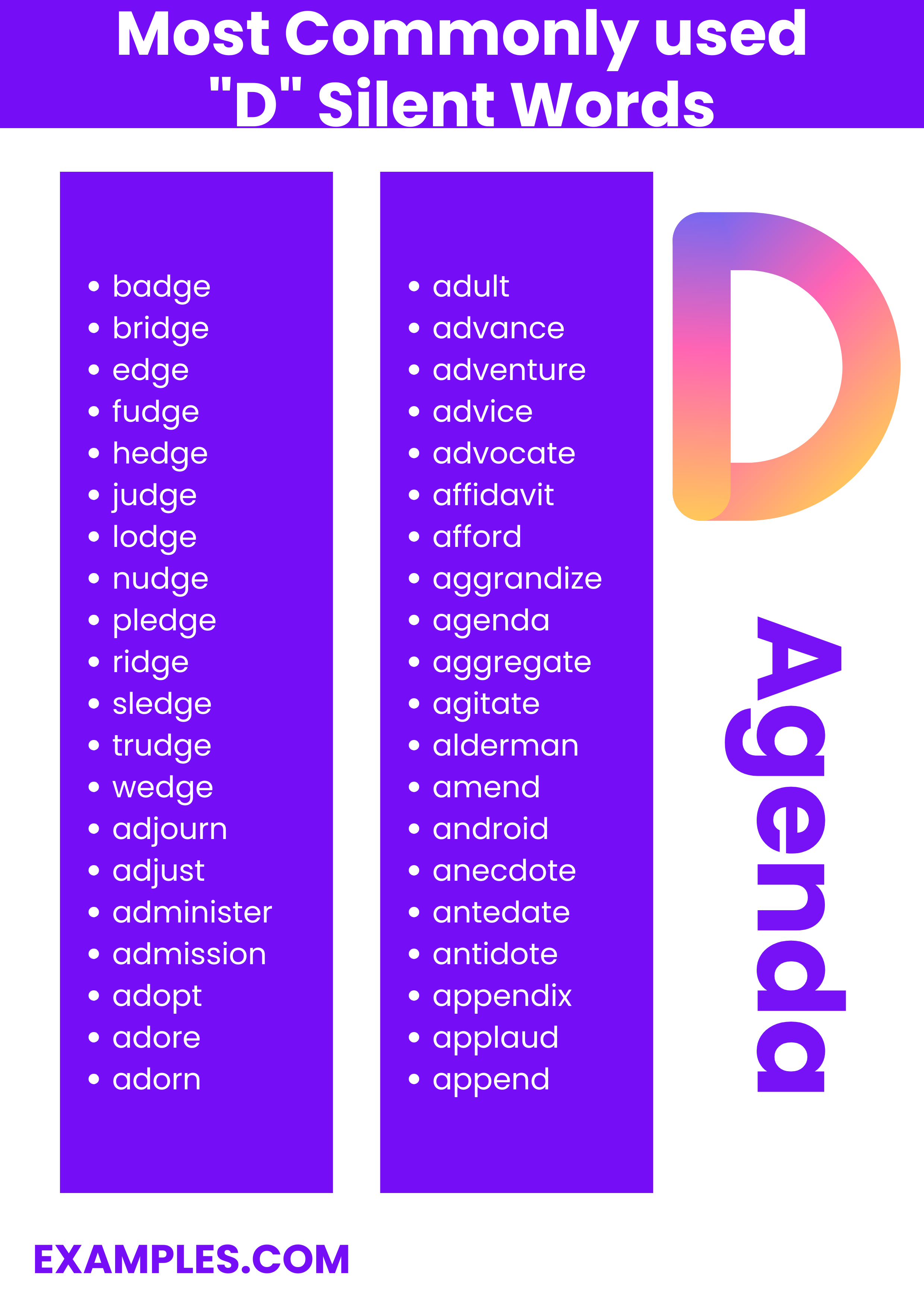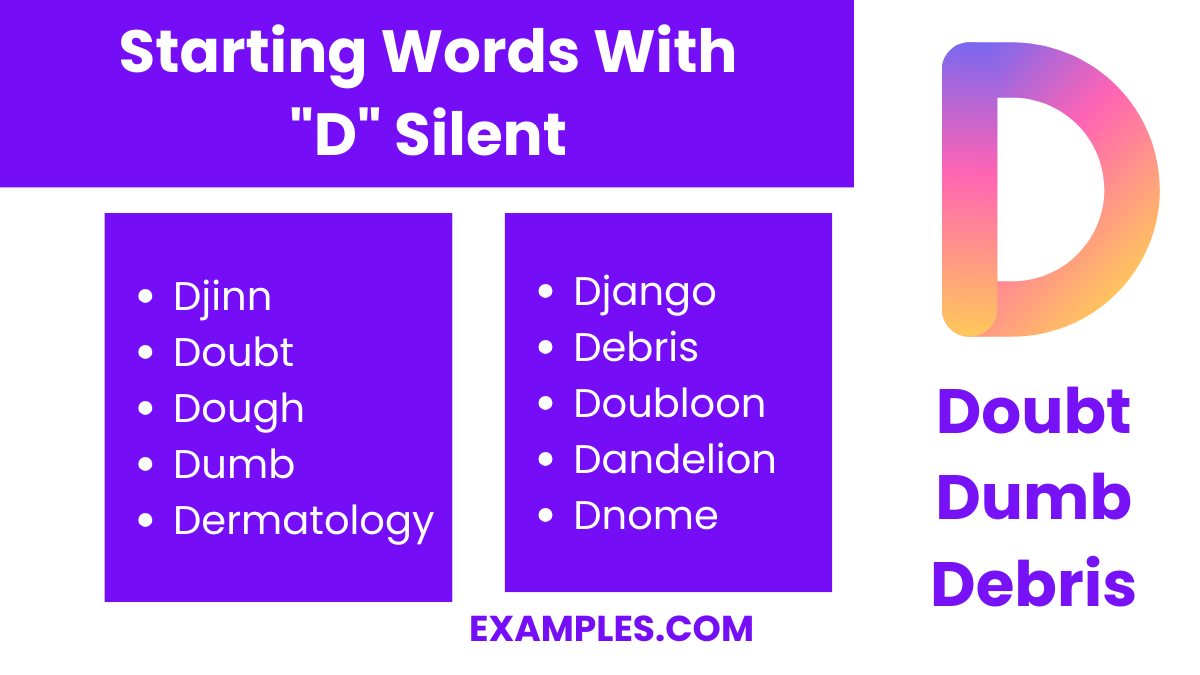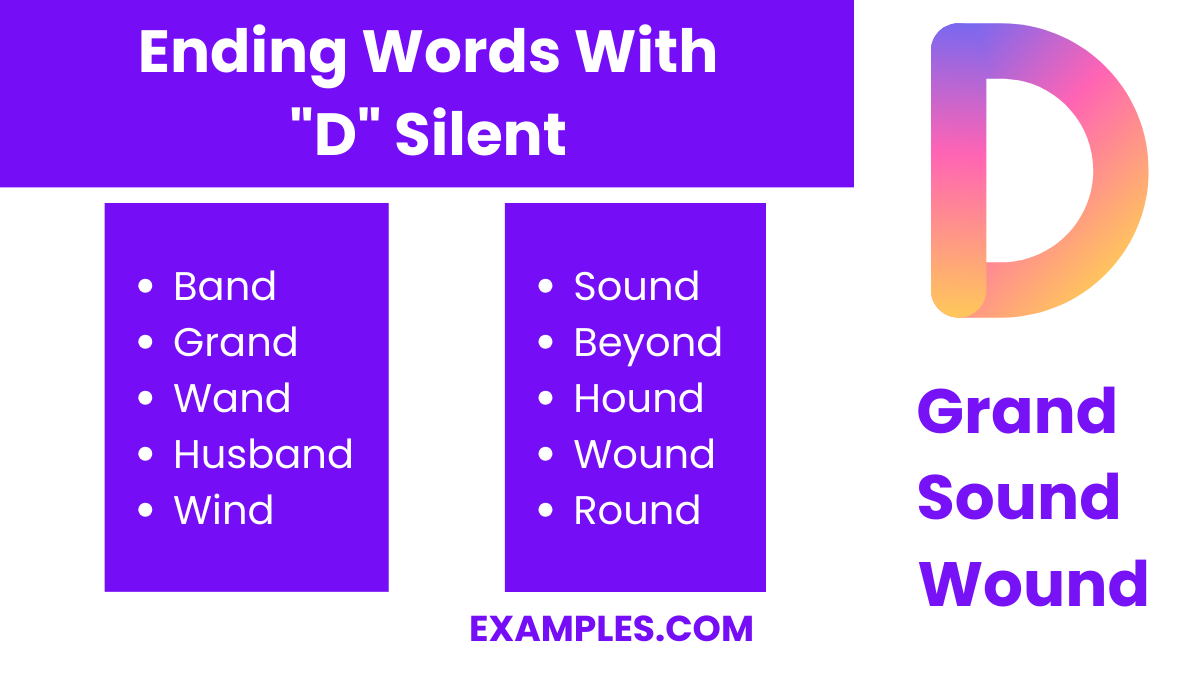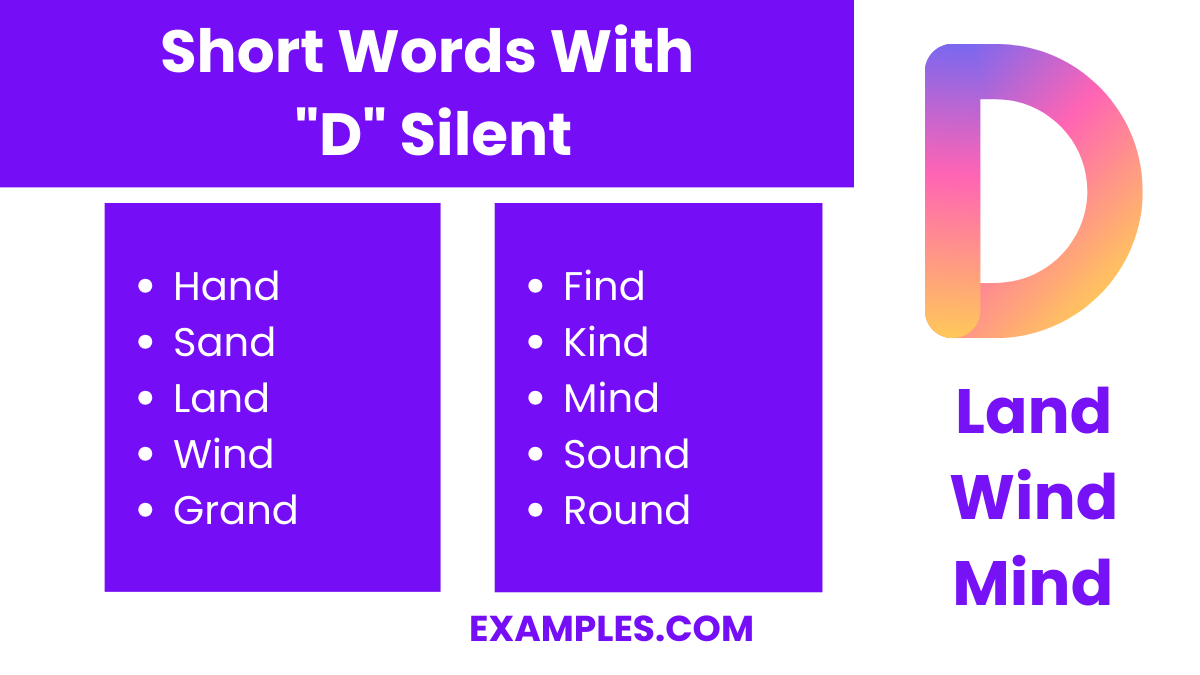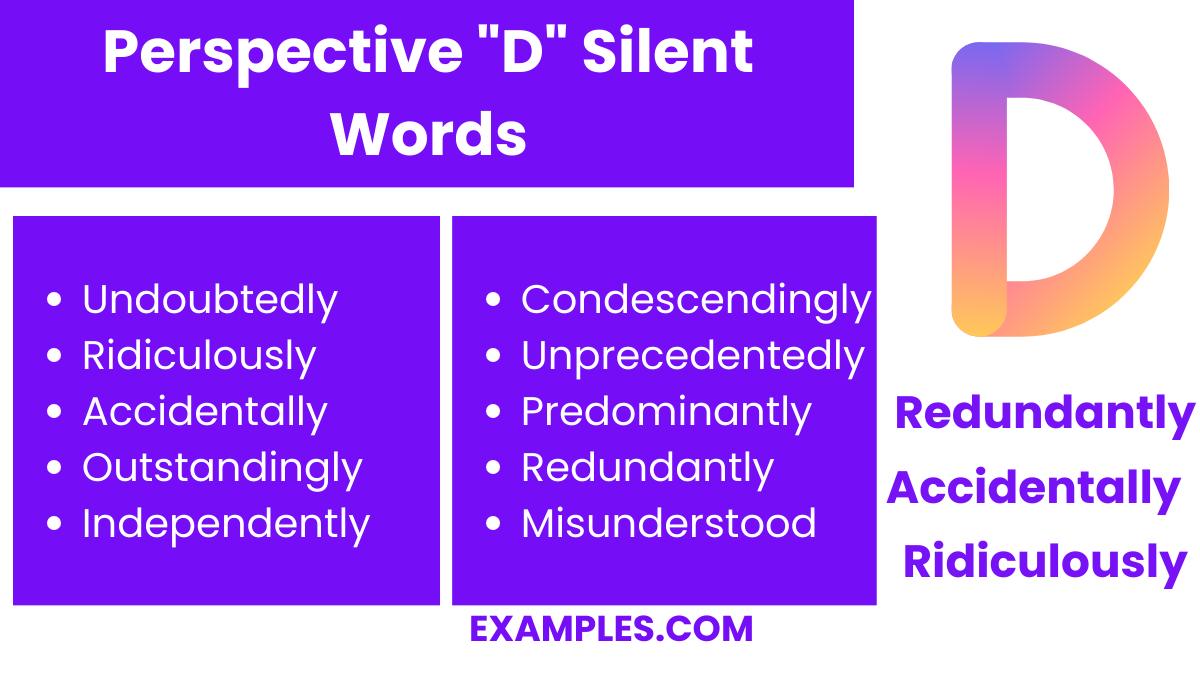450+ D Silent Words List, Meaning, PDF
Embark on a linguistic adventure with our exploration of words where the “D” words remains an unseen whisperer, silently shaping the soundscape of the English language. This unique collection unveils the hidden intricacies of pronunciation, offering a delightful challenge to learners and a valuable tool for educators. By delving into these silent “D” words, you’ll uncover the fascinating interplay between spelling and sound, enriching your vocabulary and enhancing your communication skills. Perfect for classroom discussions or self-study, this guide promises to transform your approach to English phonetics
Download Most Commonly Used D Silent Words - PDF
50+ Most Commonly used Words With “D” Silent
Diving into the world of silent “D” words uncovers a fascinating facet of the English language, revealing its complexity and the intriguing ways it evolves. These words, often remnants of older languages and dialects, challenge learners and native speakers alike with their silent letters that defy the expected phonetic rules. Teachers and students can greatly benefit from exploring these words, as they enhance linguistic understanding, pronunciation skills, and vocabulary breadth. This exploration encourages a deeper appreciation for the nuances of English, offering insights into its rich history and the diverse influences that have shaped it. By mastering these silent “D” words, learners can significantly improve their communication abilities, gaining confidence in their language use both in writing and in speech.
This table includes a selection from the list of 150 most commonly used words with a silent “D”, showcasing a variety of contexts and usages to enhance vocabulary and pronunciation skills.
| badge | bæʤ | bridge | brɪʤ | edge | ɛʤ | fudge | fʌʤ |
| hedge | hɛʤ | judge | ʤʌʤ | lodge | lɒʤ | nudge | nʌʤ |
| pledge | plɛʤ | ridge | rɪʤ | sledge | slɛʤ | trudge | trʌʤ |
| wedge | wɛʤ | adjourn | əˈʤɜːrn | adjust | əˈʤʌst | administer | ædˈmɪnɪstər |
| admission | ædˈmɪʃən | adopt | əˈdɒpt | adore | əˈdɔːr | adorn | əˈdɔːrn |
| adult | əˈdʌlt | advance | ədˈvæns | adventure | ədˈvɛntʃər | advice | ədˈvaɪs |
| advocate | ˈædvəkət | affidavit | ˌæfɪˈdeɪvɪt | afford | əˈfɔːrd | aggrandize | əˈɡrændaɪz |
| agenda | əˈʤɛndə | aggregate | ˈæɡrɪɡət | agitate | ˈæʤɪteɪt | alderman | ˈɔːldərmən |
| amend | əˈmɛnd | android | ˈænˌdrɔɪd | anecdote | ˈænɪkˌdoʊt | antedate | ˈæntɪˌdeɪt |
| antidote | ˈæntɪˌdoʊt | appendix | əˈpɛndɪks | applaud | əˈplɔːd | append | əˈpɛnd |
| ascend | əˈsɛnd | ascertain | ˌæsəˈteɪn | ascribed | əˈskraɪbd | aside | əˈsaɪd |
| asunder | əˈsʌndər | attached | əˈtætʃt | attend | əˈtɛnd | attest | əˈtɛst |
| audited | ˈɔːdɪtɪd | augmented | ɔːgˈmɛntɪd | authored | ˈɔːθərd | awarded | əˈwɔːrdɪd |
| awkward | ˈɔːkwərd | backdrop | ˈbækˌdrɒp | bandwidth | ˈbændˌwɪdθ | bedrock | ˈbɛdˌrɒk |
| bedstead | ˈbɛdˌstɛd | befuddled | bɪˈfʌdəld | begrudged | bɪˈɡrʌʤd | budge | bʌʤ |
| cadge | kæʤ | dodge | dɒʤ | edged | eɪʤd | grudge | ɡrʌʤ |
Starting Words With “D” Silent
Discover the fascinating world of silent “D” at the beginning of words, an intriguing aspect of English phonetics that often surprises learners and educators alike. This unique phonetic characteristic enriches the language, offering a glimpse into its complexity and diversity, especially within daily use English words. Teachers aiming to expand their teaching methodologies and enhance students’ understanding of English pronunciation will find this list invaluable. It not only aids in improving communication skills but also deepens students’ appreciation for the nuances of English spelling and sound relationships. Here’s a curated list of 10 words where the initial “D” is silent, providing a challenge yet an exciting opportunity for learners to master, particularly focusing on those that are part of everyday vocabulary, making the learning both relevant and practical.
- Djinn (ʤɪn) – A supernatural spirit from Arabian and Muslim mythology.
- Doubt (daʊt) – Uncertainty or lack of conviction.
- Dough (doʊ) – A thick, malleable mixture of flour and liquid, used for baking.
- Dumb (dʌm) – Unable to speak, typically because of congenital deafness.
- Dermatology (dɜːr’mætələdʒi) – The branch of medicine dealing with the skin.
- Django (ˈdʒæŋɡoʊ) – A reference to a famous jazz guitarist or used in various cultural contexts.
- Debris (dəˈbriː) – Scattered pieces of waste or remains.
- Doubloon (dəˈbluːn) – A Spanish gold coin.
- Dandelion (ˈdændɪˌlaɪən) – A common weed with a yellow flower.
- Dnome (noʊm) – A mythological dwarf-like creature that lives underground.
Ending Words With “D” Silent
English is replete with words that hold silent letters, creating a distinctive challenge for learners. The silent “D” at the end of words is a perfect example, often leaving both native and non-native speakers puzzled about pronunciation. For teachers, understanding and teaching these words, including their singular & plural words, is crucial for developing students’ phonetic skills and helping them navigate the complexities of English pronunciation. Below are 10 words that end with a silent “D,” serving as a practical tool for enhancing linguistic accuracy and fluency.
- Band – (/bænd/) A flat, thin strip or loop of material put around something, typically to hold it together or to decorate it.
- Grand (ɡrænd) – Magnificent and imposing in appearance, size, or style.
- Wand (wɒnd) – A thin stick or rod typically used by magicians or as a symbol of power.
- Husband – (/ˈhʌzbənd/) A married man considered in relation to his spouse.
- Wind (wɪnd) – To follow a course that is not straight or direct.
- Sound (saʊnd) – Vibrations that travel through the air or another medium and can be heard when they reach a person’s ear.
- Beyond (bɪˈjɒnd) – At or to the further side of.
- Hound (haʊnd) – A dog of a breed used for hunting, especially one able to track by scent.
- Wound (wuːnd) – An injury to living tissue caused by a cut, blow, or other impact, typically one in which the skin is cut or broken.
- Round (raʊnd) – Shaped like a circle or cylinder.
Middle Words With “D” Silent
In English, the presence of silent letters can often be perplexing, particularly when the silent letter is nestled within the word. The silent “D” in the middle of words is a classic example, challenging yet intriguing for learners to master. Teachers focused on enhancing students’ pronunciation and spelling skills, especially through dictation words, will find these examples particularly useful. Addressing these nuances can significantly impact students’ confidence and competence in English communication. Here are 10 words with a silent “D” in the middle, each accompanied by a brief definition, ideal for dictation exercises to reinforce learning and understanding.
- Wednesday (ˈwɛnzdeɪ) – The day of the week following Tuesday and preceding Thursday.
- Handsome (ˈhænsəm) – Pleasing in appearance especially by reason of conformity to ideals of form and proportion.
- Handkerchief (ˈhæŋkərtʃɪf) – A square piece of fabric used for wiping the eyes or nose or as an accessory.
- Sandalwood (ˈsændəlwʊd) – A class of woods from trees in the genus Santalum, used for making perfume and incense.
- Sandwich (ˈsænwɪtʃ) – An item of food consisting of two pieces of bread with meat, cheese, or other filling between them.
- Hedgehog (ˈhɛʤhɒg) – A small nocturnal mammal with a spiny coat and short legs, able to roll itself into a ball for defense.
- Handful (ˈhændfʊl) – A quantity that fills the hand.
- Handrail (ˈhændˌreɪl) – A rail fixed to posts or a wall for people to hold on to for support.
- Thunder (ˈθʌndər) – A loud rumbling or crashing noise heard after a lightning flash due to the expansion of rapidly heated air.
- Landmark (ˈlændˌmɑrk) – An object or feature of a landscape or town that is easily seen and recognized from a distance, especially one that enables someone to establish their location.
Long Words With “D” Silent
Dive into the world of long words with silent “D”, a treasure trove for those fascinated by the subtleties of English pronunciation, especially when it comes to describing words that add depth to expressions. This selection not only challenges learners to refine their phonetic skills but also enriches their vocabulary with less commonly known terms. Perfect for educators looking to introduce advanced linguistic concepts, these examples illustrate the unpredictable nature of English spelling and sound correlation.
- Handwriting – (/ˈhændˌraɪtɪŋ/) The action or skill of writing by hand.
- Handkerchief (ˈhæŋkərtʃɪf) – A square of fabric used for wiping the nose or eyes.
- Handsome (ˈhænsəm) – Pleasing in appearance, especially of a man.
- Grandiloquent (ɡrænˈdɪləkwənt) – Pompous or extravagant in language, style, or manner.
- Indictment (ɪnˈdaɪtmənt) – A formal charge or accusation of a serious crime.
- Rendezvous (ˈrɒndɪvuː) – A meeting at an agreed time and place.
- Sandwich (ˈsænwɪtʃ) – Two pieces of bread with a filling between them.
- Subdued (səbˈdjuːd) – Quiet and rather reflective or depressed.
- Handicraft (ˈhændɪkræft) – Activity involving the making of decorative domestic or other objects by hand.
- Underground (ˈʌndərˌɡraʊnd) – Beneath the surface of the ground.
Short Words With “D” Silent
Short words with a silent “D” in English are quite rare, as the “D” is usually pronounced in most contexts. However, there are a few exceptions where the “D” might not be as prominently voiced or is part of a specific dialect or pronunciation variant. These words can be intriguing for learners due to their unique pronunciation patterns, offering insights into the diversity and flexibility of English pronunciation. Here are some examples:
- Hand – (/hænd/) Used in some dialects where the “D” might be less pronounced, referring to the end part of a person’s arm beyond the wrist.
- Sand – (/sænd/) In some accents or rapid speech, the “D” can be very soft or almost silent, meaning a loose granular substance resulting from the erosion of rocks.
- Land – (/lænd/) In certain dialects or speech patterns, the “D” might not be fully voiced, referring to the part of the earth’s surface that is not covered by water.
- Wind (as in “the wind blew”) – (/wɪnd/) In some pronunciations, especially in poetic or archaic use, the “D” can be soft, referring to the natural movement of the air.
- Grand – (/ɡrænd/) While not typically silent, in some non-standard dialects, the “D” can be less pronounced, meaning large and impressive in size or scope.
- Find – (/faɪnd/) In rapid or casual speech, especially in certain dialects, the “D” might be softened or less audible, meaning to discover or perceive by chance or unexpectedly.
- Kind – (/kaɪnd/) In some accents or informal speech, the “D” might be lightly pronounced, referring to a group of people or things having similar characteristics.
- Mind – (/maɪnd/) In specific dialects or colloquial speech, the “D” can be very soft, referring to the element of a person that enables them to be aware of the world and their experiences.
- Sound – (/saʊnd/) In certain regional accents, the “D” at the end might be less pronounced, meaning vibrations that travel through the air or another medium and can be heard when they reach a person’s ear.
- Round – (/raʊnd/) In some dialects or informal speech, the “D” might be softened, meaning shaped like or approximately like a circle or cylinder.
Perspective “D” Silent Words
Engage with perspective words featuring a silent “D”, a category that offers unique insights into how perspective and context influence understanding and communication. This selection is particularly beneficial for educators aiming to deepen students’ comprehension of nuanced English usage and the impact of silent letters on pronunciation. These words, when used effectively, can broaden learners’ perspectives on language learning, making it a more enriching and thought-provoking experience. Here are 10 perspective words where the “D” stays silent, each reflecting different angles and viewpoints:
- Undoubtedly (ʌnˈdaʊtɪdlɪ) – Without doubt; certainly.
- Ridiculously (rɪˈdɪkjʊləslɪ) – In an absurd or silly way.
- Accidentally (ˌæksɪˈdɛntəlɪ) – By chance; inadvertently.
- Outstandingly (aʊtˈstændɪŋlɪ) – Exceptionally well; remarkably.
- Independently (ˌɪndɪˈpɛndəntlɪ) – Without outside help; autonomously.
- Condescendingly (ˌkɒndɪˈsɛndɪŋlɪ) – In a patronizing manner.
- Unprecedentedly (ʌnˈprɛsɪdɛntɪdlɪ) – In a manner never before seen or experienced.
- Predominantly (prɪˈdɒmɪnəntlɪ) – Mainly; for the most part.
- Redundantly (rɪˈdʌndəntlɪ) – Exceeding what is necessary or normal; superfluously.
- Misunderstood (ˌmɪsʌndərˈstʊd) – Incorrectly interpreted or comprehended.
In conclusion, exploring words with a silent “D” offers a unique opportunity to delve into the intricacies of English vocabulary pronunciation, enriching both teaching and learning experiences. This journey through silent “D” words not only enhances linguistic skills but also fosters a deeper appreciation for the complexity and beauty of the English language, making it an indispensable resource for educators and students alike.



